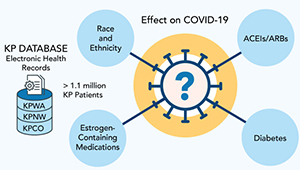Susan Shortreed, PhD
Biography
Susan Shortreed, PhD, uses statistics and machine learning methods to address health science problems, with a special emphasis on analyzing complex longitudinal data. She develops and evaluates statistical approaches for observational data, and works to improve the design and analyses of studies that use data collected from electronic health care records. She is leading a project to develop statistical methods for constructing personalized treatment strategies using data captured from electronic health records.
Dr. Shortreed earned her PhD in statistics from the University of Washington. Then she spent two years in the Department of Epidemiology and Preventive Medicine at Monash University in Melbourne, Australia, and two years in the School of Computer Science at McGill University in Montreal, Canada. Dr. Shortreed has collaborated with scientists in a broad range of areas including alcohol use, cancer screening, and medication safety. She now works alongside researchers in mental and behavioral health, evaluating and comparing treatments for chronic pain and depression, and interventions to prevent suicide. Dr. Shortreed is an investigator with the Mental Health Research Network, designing studies to address important public health concerns, such as determining which antidepressant medications work best for which patients and developing risk prediction algorithms to identify individuals who may be at increased risk for suicidal behavior.
Dr. Shortreed is also an affiliate professor of biostatistics at the University of Washington School of Public Health. She served on the executive board for the American Statistical Association’s Section on Statistics in Epidemiology and the editorial board of the Journal of the Royal Statistical Society, Series C: Applied Statistics.
Research interests and experience
-
Biostatistics
Design and analysis of studies that use data collected from electronic health records; analysis of complex longitudinal data; methods for constructing personalized treatment strategies, computational statistics and algorithms; machine learning; variable selection methods.
Medication Use & Patient Safety
Biostatistics; machine learning; using data collected from electronic health records to study rare adverse events; opioid safety; medication safety in pregnancy.
-
Mental Health
Biostatistics; treatment for chronic depression; suicide prevention; developing personalized treatment strategies; developing risk prediction models.
Recent publications
Williams EC, Lapham GT, Shortreed SM, Rubinsky AD, Bobb JF, Bensley KM, Catz SL, Richards JE, Bradley KA. Among patients with unhealthy alcohol use, those with HIV are less likely than those without to receive evidence-based alcohol-related care: a national VA study. Drug Alcohol Depend. 2017 May 1;174:113-120. doi: 10.1016/j.drugalcdep.2017.01.018. Epub 2017 Mar 6. PubMed
Hanuese S, Shortreed SM. On the use of electronic health records for comparative effectiveness research. In: Gatsonis C, Morton SC, editors. Methods for Comparative effectiveness research. CRC Press PubMed
Hansen RN, Walker RL, Shortreed SM, Dublin S, Saunders K, Ludman EJ, Von Korff M. Impact of an opioid risk reduction initiative on motor vehicle crash risk among chronic opioid therapy patients. Pharmacoepidemiol Drug Saf. 2016 Nov 14. doi: 10.1002/pds.4130. [Epub ahead of print]. PubMed
Turner JA, Shortreed SM, Saunders KW, LeResche L, Thielke S, Von Korff M. Does association of opioid use with pain and function differ by fibromyalgia or widespread pain status? Pain. 2016 Oct;157(10):2208-16. doi: 10.1097/j.pain.0000000000000631. PubMed
Shortreed SM, Johnson EJ, Rutter CM, Kamineni A, Wernli KJ, Chubak J. Cohort restriction based on prior enrollment: Examining potential biases in estimating cancer and mortality risk. Obs Stud. 2016 Aug;2:51-64. Epub 2016 Sep 26. PubMed
Thielke S, Shortreed SM, Saunders K, Turner JA, LeResche L, Von Korff M. Predictors of continuing opioid use at one year among chronic pain patients. Clin J Pain. 2016 Jul 15. [Epub ahead of print]. PubMed
Thielke S, Shortreed SM, Saunders K, Turner JA, LeResche L, von Korff M. A prospective study of predictors of long-term opioid use among patients with chronic non-cancer pain. Clin J Pain. 2016 Jul 15. [Epub ahead of print]. PubMed
Rossom RC, Shortreed S, Coleman KJ, Beck A, Waitzfelder BE, Stewart C, Ahmedani BK, Zeber JE, Simon GE. Antidepressant adherence across diverse populations and healthcare settings. Depress Anxiety. 2016 Jun 20. doi: 10.1002/da.22532. [Epub ahead of print]. PubMed
Turner JA, Shortreed SM, Saunders KW, LeResche L, Von Korff M. Association of levels of opioid use with pain and activity interference among patients initiating chronic opioid therapy: a longitudinal study. Pain. 2016 Apr;157(4):849-57. doi: 10.1097/j.pain.0000000000000452. PubMed
Simon GE, Coleman KC, Rossom R, Beck A, Oliver M, Johnson E, Whiteside U, Operskalski B, Penfold RB, Shortreed SM, Rutter C. Risk of suicide attempt and suicide death following completion of the patient health questionnaire depression module in community practice. J Clin Psychiatry. 2016 Feb;77(2):221-7. doi: 10.4088/JCP.15m09776. PubMed
Research

COVID risks not meaningfully greater with estrogen-containing medications
Oral contraceptives, hormone therapy not linked to more severe COVID outcomes.
Research

A medication that can relieve symptoms of psychosis is underused
Study finds that many patients who might benefit from clozapine don’t receive it.
Research

New findings on treating hypertension in pregnancy
A study led by Dr. Sascha Dublin finds similar outcomes for 3 hypertension medications, filling an evidence gap.
COVID-19

Greater infection risks linked to COVID-19 disparities
New work by Susan Shortreed, PhD, finds infection risks drive worse outcomes for some racial and ethnic groups.
Drugs, diabetes, disparities

Studying COVID-19 risk and outcomes
Dr. Sascha Dublin tells how studies of KP electronic health record data can improve COVID-19 treatment and prevention.
KPWHRI IN THE MEDIA
Simpler models for predicting suicide risk work comparably to more complex ones
Q&A: Simple machine learning model predicts suicide risk well
Healio Psychiatry, April 12, 2023



